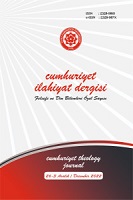İslami İlimler Fakültesi Öğrencilerinin Akademik Motivasyonları ve Algıladıkları Okul İklimi İlişkisi: Selçuk Üniversitesi İslami İlimler Fakültesi Örneği
The Relationship between Academic Motivation and Perceived School Climate the Students of the Faculty of Islamic Sciences’ Students: The Case of Selçuk University Faculty of Islamic Sciences
Author(s): Sümeyra Bilecik KaracanSubject(s): Higher Education , State/Government and Education, Sociology of Education, Sociology of Religion
Published by: Cumhuriyet Üniversitesi İlahyat Fakültesi
Keywords: Religious Education; Higher Religious Education; Students of the Faculty of Islamic Sciences; Academic Motivation; School Climate;
Summary/Abstract: Academic motivation and school climate perception are two factors affecting the learning process and outcomes of individuals. Although the factors affecting the motivation of individuals are different from each other, it is already known that the motivation realized by internal or external factors increases the quality of learning. Similarly, although the school climate, which includes the values, norms, and communication of individuals in the institution, varies for each institution, the positive or negative effects of the perceived school climate on learners do not change. Academic motivation and perceived school climate are issues affecting all individuals at every stage of education. Although there are various studies conducted on the academic motivation and school climate of undergraduate students in the literature, there is no study on the sampling of higher religious education students. In the present study, the academic motivation and perceived school climate levels of the students who were studying in higher religious education institutions and the relationship between them were tested. It was also aimed to determine the reasons for choosing the faculty, the profession they wanted to pursue after graduation, their belief that they could get a job after graduation, and whether there was a significant difference between academic motivations and school climate perceptions. The correlational survey model, which is one of the quantitative research methods, was preferred for this purpose. The sampling of the study consisted of 425 students who were studying at the Faculty of Islamic Sciences at Selcuk University in the 2021-2022 academic year. The “Academic Motivation Scale” and “School Climate Scale for University Students” were used as the data collection tools.. According to the findings, the academic motivation levels of the students in the sampling group (x̅= 4.42) were found to be above the average. The average scores received by the students in the School Climate Scale for University Students (x̅=3.67) also indicated the existence of an open-positive setting in the learning environment. A positive and moderately significant relationship was detected between the academic motivations and school climate perceptions of the students in the sampling group (r=.340 p=.000
Journal: Cumhuriyet İlahiyat Dergisi
- Issue Year: 26/2022
- Issue No: 3
- Page Range: 1143-1160
- Page Count: 18
- Language: Turkish

